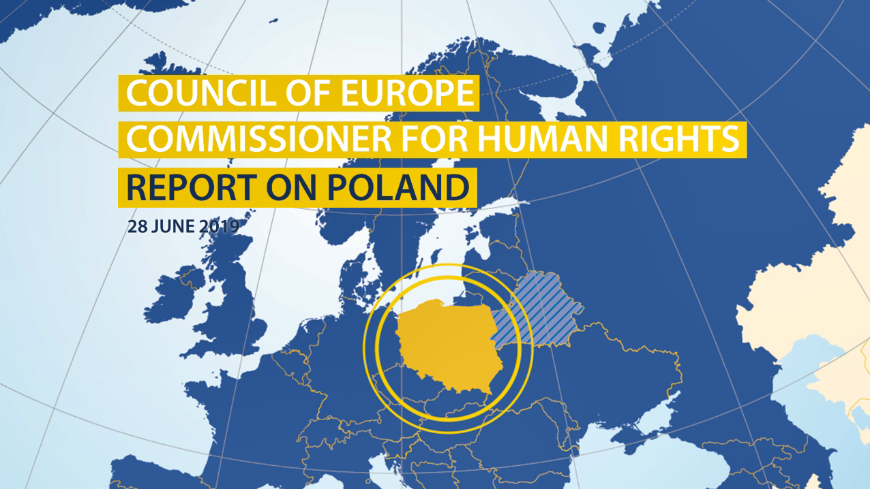Today the Council of Europe Commissioner for Human Rights, Dunja Mijatović, published a report on the visit to Poland she carried out from 11 to 15 March 2019. The report focuses on the independence of the judiciary and the prosecution service, women’s sexual and reproductive rights, gender equality and domestic violence.
The Commissioner considers that Poland’s wide-ranging judicial reform has had a major impact on the functioning and independence of the country’s justice system, fundamentally affecting its key building blocks. The reform, accompanied by a polarising public campaign to discredit judges, has led to protests by both the legal professions and the general public. “Members of the executive and the legislature have a duty to uphold the independence of the judiciary and to avoid undermining public confidence in it”, says the Commissioner, adding that “the Polish authorities should exercise responsibility and lead by example in their public discourse”. She also recommends subjecting any legislation relating to the judicial reform to thorough consultation with members of the judicial community and other relevant actors. “Improving accountability or efficiency of the justice system may not be pursued at the expense of judicial independence”, concludes the Commissioner.
The Commissioner deeply regrets that the Polish authorities have not yet found a solution to the prolonged deadlock affecting the Constitutional Tribunal. “The Tribunal’s independence and credibility have been seriously compromised by the persisting controversy surrounding the election and the status of its new President and several of its new judges. The Polish authorities should urgently resolve that deadlock,” Commissioner Mijatović recommends.
While the Commissioner welcomes the reinstatement of all forcibly retired judges of the Supreme Court and of the Supreme Administrative Court, she considers that serious concerns remain as to the composition and independence of the National Council for the Judiciary. She regrets the pre-term removal of the body’s members and urges the authorities to bring the legislation governing the body’s composition in line with Council of Europe standards and the Polish Constitution.
The Commissioner was struck by the dismissal and replacement of many court presidents and vice-presidents, as well as reports of an even higher number of dismissals and demotions among Polish prosecutors. She was also concerned by the numerous cases of disciplinary proceedings instituted against judges and prosecutors in recent times. “Judges and prosecutors have the right to express their views on matters of public interest”, the Commissioner recalls, urging the authorities to “ensure that disciplinary proceedings are not instrumentalised and that the right to a fair trial of any person subjected to them is secured”.
The Commissioner observes that legislative changes in recent years have expanded even further the already vast powers of the combined functions of Minister of Justice and Prosecutor-General. She invites Poland to separate these functions and to limit their respective powers vis-à-vis judges and prosecutors.
The Commissioner finds that Poland has yet to ensure effective access to lawful abortion throughout the country, despite the passage of several years since the European Court of Human Rights issued several key judgments against Poland on access to abortion and the related care. “Polish authorities should urgently adopt the necessary legislation to ensure the accessibility and availability of legal abortion services in practice”, the Commissioner says. Moreover, even with Poland’s already very restrictive legislation, there have been repeated attempts to further curtail access to abortion, including a bill currently pending in Parliament. The Commissioner calls on the Parliament to reject this and any other legislative proposal that seeks to further erode women’s sexual and reproductive rights.
Noting the shifting public attitudes to the question of abortion, the Commissioner invites the Polish authorities to consider making abortion legal on a woman’s request in early pregnancy, and thereafter throughout pregnancy to protect women’s health and lives and ensure freedom from ill-treatment. The Commissioner considers the introduction of the requirement of a prescription for emergency contraception as an additional barrier for women in Poland, and encourages the authorities to make this type of contraception available again for over the counter sale.
Poland has a solid legal framework protecting equality between men and women, but its policy framework should be updated, in particular through a new national action plan on gender equality. The Commissioner also encourages the adoption of dedicated programmes and measures to further the advancement of women and their political participation, as well as measures to prevent and combat sexism and its manifestations in the public and private spheres. The Commissioner welcomes the significant increases in government funding for, and the availability of, public childcare, and encourages the authorities at central and local level to pursue this approach.
Welcoming the Polish authorities’ stated commitment to combating domestic violence, the Commissioner encourages them to give practical and effective application to the Council of Europe Istanbul Convention, including by ensuring application of the existing legislation across the country, as well as the provision of a sufficient number and quality of shelters for women victims of violence and their children.
The Commissioner is concerned that the interruption of access to central government funding has obliged leading women’s rights organisations to limit their activities in recent years, negatively affecting their ability to help victims. “Civil society organisations are often the main providers of assistance to victims of domestic violence. The authorities should create and maintain safe and favourable conditions for their activities, including through their unhindered and stable access to public funding”.
Lastly, the Commissioner invites the authorities to increase public awareness about domestic violence, and encourages all politicians and opinion-makers to give vocal support to the advancement of women’s rights and gender equality.
- Read the Commissioner's Report on Poland following her visit to the country in March 2019 (the report in Polish | Przeczytaj raport po polsku)
- Read the comments of the authorities of Poland on the report of the Commissioner (comments in Polish | przeczytaj stanowisko Rządu po polsku)
- Watch the report in a nutshell (video)



